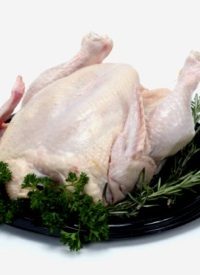
The United States Department of Agriculture is pondering changes in the regulation of “natural” chicken. The major poultry producers in the nation — Perdue, Pilgrim’s Pride, and Tyson Foods — have taken different sides in this argument. Perdue claims that its competitors, Pilgrim’s Pride and Tyson, are injecting water and salt into their poultry, increasing the weight of the chicken artificially.
Water and salt, of course, are essential to human life. Those chemicals are also essential to the life of chickens. Hired guns — lobbyists — have entered the fray, helping both sides make their case to the Food and Safety Inspection Service of the Department of Agriculture. New regulations are expected this fall on what constitutes “natural” chickens.
No one is seriously contending that water and salt are poisons. Virtually anything taken in excess is toxic. Trace elements that would harm humans in large doses are also essential, in small amounts, to human health. This is certainly true of sodium and H2O. Chicken without water and salt would be bland, unsavory food. The arguments made by Perdue are not directed uniquely at public health issues related to chickens sold by Pilgrim’s Pride and Tyson Foods. The arguments it makes that excessive sodium can cause health problems in certain patients is the sort of argument which could be made about any product sold to consumers.
Perdue, rather, is arguing to the federal government that its competitors have an unfair trade advantage by labeling as “natural” chickens that have more water and salt in them than would occur in nature. Other poultry producers have also gotten in the mix. Foster Farms of Livingston, California, sells foods marinated with salt, but it makes the salt content clear to consumers.
There are private organizations that can advise consumers with much more agility and much less politics than government agencies. The American Heart Association, for example, can provide information on which producers of products have an unsafe amount of sodium for heart patients, and that information can be provided free of political wrangling. Private associations have long been excellent at protecting the consumer, and the sale of chickens is an excellent example of that. Orthodox Jews eat Kosher chicken, which means that the chicken must be slaughtered in a particular way (among other things). Rabbis are entrusted with the responsibility of making sure that Kosher butchers and food producers adhere to the laws of Kashrut. The system works so well that many non-Jews prefer eating Kosher foods because they believe, with some justice, that the standards of hygiene and care are greater if there is a "K" on the label. Private associations, without government oversight, have provided a highly effective system. (A famous commercial for Hebrew National kosher frankfurters shows Uncle Sam eating a non-kosher hot dog that adheres to government standards, but not Hebrew National’s. As the camera pans heavenward, the voiceover proclaims: "We answer to a higher authority!")
The market itself provides an even better mechanism for holding companies accountable. What prevents, for example, Perdue from running advertisements that compare the sodium levels in its chickens sold at groceries with chickens sold by Pilgrim’s Pride and Tyson Foods? If Perdue were dishonest in its advertising, its competitors could sue. If not, then Perdue could be rewarded by consumers for marketing healthier products.
Instead, this has become a political issue, rather than a marketing issue. Tyson Food representative Gary Mickelson has noted that salt and water are very natural and that putting them into chickens does not make the chickens unnatural. Gary Rhoades with Pilgrim’s Pride states that its company offers chicken with the extra salt and water and without extra salt and water, and that this was to give consumers a choice of products.
As evidence of how politicized this has become, Barbara Boxer held a press conference earlier this year, asking USDA to “immediately prevent sodium injected chickens from using the "natural" label and require all poultry producers to identify added ingredients in print large enough to ensure that consumers can make informed choices." Will government officials and politicians end up determining what the word “natural” means on a packet of chicken? It looks like that well may happen.



